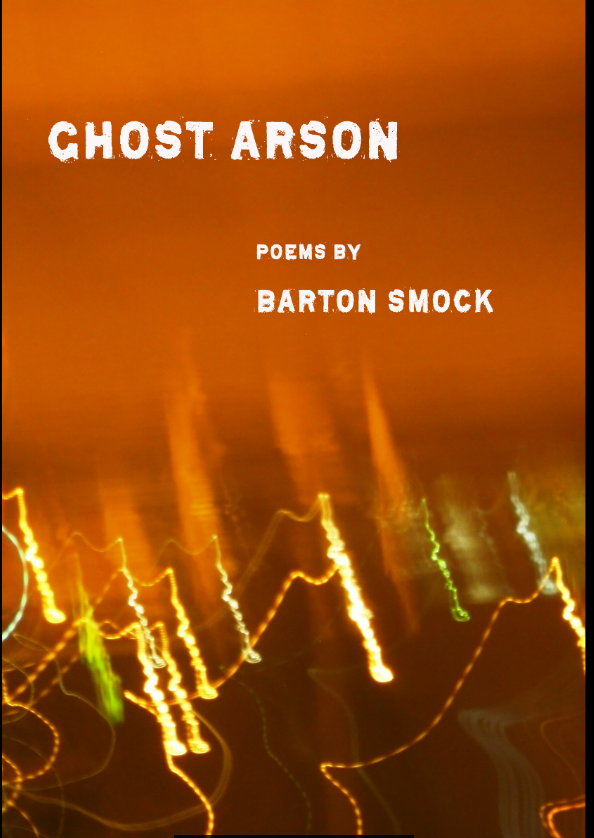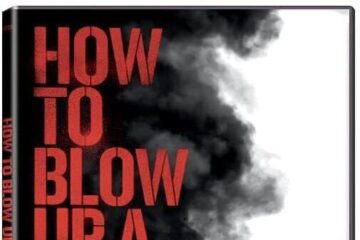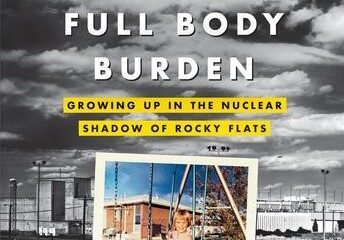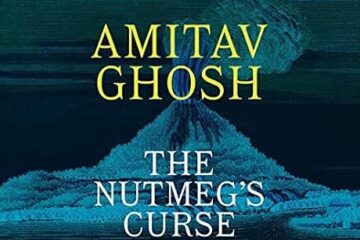Recently, I had the pleasure of reading Barton Smock’s collection, Ghost Arson–released from Kung Fu Treachery Press– and was able to speak with him about his inspiration for the book, the writerly life, and what’s next for him as a writer and publisher. Our conversation is below.
Crystal Stone: Your poems and narratives are as ethereal as the ghost arson that emerges and vanishes in the text. In the modern age where longer narrative poems have become popular, I wonder how you’ve preserved a more compressed, compact and playful style. Who were you reading when you were inspired to write “Ghost Arson”?
Barton Smock: I think all pray differently…but once one is a prayerful being, preservation of act and aftermath is more subconscious than anything else. Whatever it is I actively do is done knowing, or learning to know, what symbol I want to represent for either the god or the alien that sees me from space or from water or, etc. I copy, I strive, and try to recreate the vision that so fleetingly has shown me how it looks on the page. As for the persons I was reading when hovering above where Ghost Arson landed…the uncompromising inquiries of Kazim Ali (Inquisition and Silver Road) and Natalie Eilbert (Indictus)…and also the precise proximities of Maurice Manning (Bucolics) and Michelle Gottschlich (Void Sets).
CS: I noticed that you self-published your collections in the past. Why did you choose to publish with Kung Fu Treachery Press this time? How is your work similar or different to the other poetry you’ve read from them?
BS: I began self-publishing (or on-demand publishing) in 2011 at first as a way to order some things that I felt were losing the essence of what made them, to me, acolytes…and as time went on, it was a way to take up space without crowding around or out. My choice to publish with Kung Fu Treachery Press came from a writing friendship with Jason Ryberg, whose work I admire, and a conversation we had in regards to my own work. I had entered some previous versions of Ghost Arson into chapbook contests, but would always withdraw the entry before hearing back…not always sure why, but probably very sure why. Anyway, Jason and his press let me do what I wanted with the work, allowed my repetitions, and interpreted kindly and correctly my sparse outlook into the cover design and into their exhibiting of my inner. The work I’ve read of their authors might not immediately seem similar, or parallel, but there was an underlying nostalgia in the content that seemed to me progressive, and alike, and I felt individually at home, there, and collectively far off.
CS: I see that you’re the managing editor of isacoustic*, a husband, and a father of four kids. How do you juggle all of those responsibilities and still have time to write? Do you still sleep?
BS: Short answer: I don’t have time and I don’t sleep, ha. Longer: These are self-inflicted ways of going about in the world, and I try, deliberately, to have purpose…so whether it be that time goes away, or just kind of appears…the work of wounding the scar gets done or is at least misguided enough to evoke a path.
CS: How does your religious background (or lack thereof) influence your representation of god throughout the collection?
BS: God means too many things. Any throughout is a lack, and it is there that I worship. If there is to be anything left of my avoidance, influence is a permission I must allow. I was brought up in a religious household, and my parents sang together in church, and sang, separately, in cars I fell asleep in. This is, and was, the closest I’ve been to god. I was recently at a poetry reading listening to Kazim Ali and Blas Falconer, and they both named for me a vehicle, or a movement, I could fall asleep in. At that same reading, during the inquiry portion, the poet Ruth Awad asked Kazim Ali if writing about god was an attempt to get closer to god, and if the attempt was successful. Ali said no, but more beautifully than that…but in my own paraphrasing, I’d say that reading Ali, and others, makes me feel closer to god. Or, to a god. Religious background is a thing I reach for.
CS: I noticed a lot of imagery related to milk and motherhood. In one poem, the speaker calls themselves “motherly.” Are you the speaker or is the ghost arson? Or is it an entirely different persona?
BS: I have come to regard my speakers as childish, so, yeah, many of my connections are generically subversive and persona is there just long enough to still the frog. I hope readers meet me where I’m stuck. Where maybe milk can exist as nothing more than water’s ghost. Where I am motherly in that I was, at one time, brief.
CS: What’s next for Barton Smock? Did you have any new poetry plans in the next few months?
BS: No new poetry plans beyond presence. I hope to do some readings in regards to Ghost Arson after it releases in December, and hope to keep {isacoustic*} from vanishing.
Author Bio: Barton Smock lives in Ohio with his wife and four children. Is the author of the chapbook infant*cinema (Dink Press 2016) and the editor of isacoustic* (isacoustic.com)
Interviewer Bio: Crystal’s poetry has previously appeared or is forthcoming in Sport Literate, Collective Unrest, Driftwood Press, New Verse News, Occulum, Anomaly, BONED, Eunoia Review, isacoustics, Tuck Magazine, Writers Resist, Drunk Monkeys, Coldnoon, Poets Reading the News, Jet Fuel Review, Sigma Tau Delta Rectangle, North Central Review, Badlands Review, Green Blotter, Southword Journal Online and Dylan Days. She is currently pursuing her MFA at Iowa State University, gave a TEDx talk on poetry the first week of April and her first collection of poetry, Knock-Off Monarch, is forthcoming from Dawn Valley Press this autumn. In her free time, she edits poetry and writes poetry book reviews for Flyway: Journal of Environmental Writing. You can find her on Twitter @justlikeastone8 and on instagram @stone.flowering or at her website: www.crystalbstone.com.




